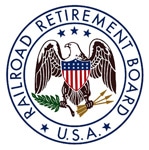
The adjusted reduction amount is based on revised projections of benefit claims and payments under the Railroad Unemployment Insurance Act. It will remain in effect through Sept. 30, 2015, the end of the fiscal year. Reductions in future fiscal years, should they occur, will be calculated based on applicable law.
The daily benefit rate is $70, so the 7.3 percent reduction in railroad unemployment and sickness benefits will reduce the maximum amount payable in a 2-week period with 10 days of unemployment from $700.00 to $648.90.
Certain railroad sickness benefits are also subject to regular tier I railroad retirement taxes, resulting in a further reduction of 7.65 percent. Applying the 7.3 percent reduction to these sickness benefits will result in a maximum 2-week total of $599.26.
These reductions are required under the Budget Control Act of 2011 and a subsequent sequestration order to implement the mandated cuts. The law exempted social security benefits, as well as railroad retirement, survivor, and disability benefits paid by the RRB, from sequestration.
When sequestration first took effect in March 2013, railroad unemployment and sickness benefits were subject to a 9.2 percent reduction. This amount was then adjusted to 7.2 percent in October 2013.
In fiscal year 2013, the RRB paid more than $11.7 billion in retirement and survivor benefits to about 592,000 beneficiaries, and net unemployment-sickness benefits of $90.7 million to more than 26,000 claimants.
Related News
- Union Mourns the Loss of Brother Charles Harrison
- FRA Issues Grade-Crossing Safety Advisory
- Amtrak To Give SMART-TD Members Holiday Bonuses
- Value of Unions
- 2026 Railroad Retirement and Unemployment Insurance Tax Changes
- SMART-TD Members on UP Properties Ratify Five-Year Agreement
- Railroader’s Son to Perform at Carnegie Hall
- Rail Trespassing and Suicide Fatalities Up 70%
- Help the McLucas Family After Fire Destroys Their Home
- SMART-TD’s Chris Smith Wins City Council Seat in Tama, Iowa